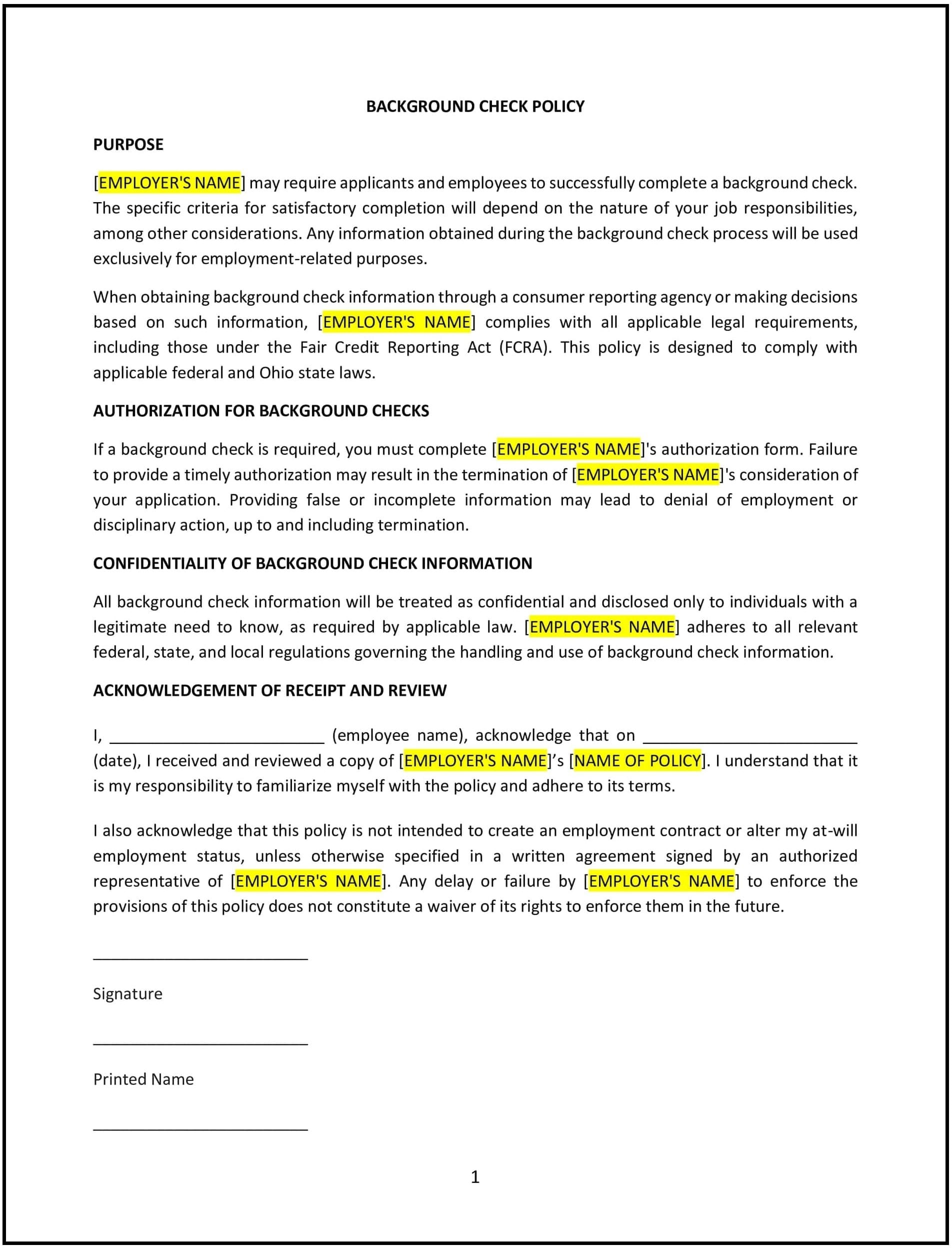Got contracts to review? While you're here for policies, let Cobrief make contract review effortless—start your free review now.

Customize this template for free
Background check policy (Ohio)
A background check policy establishes the process Ohio businesses follow to verify the criminal history, employment history, and other relevant background information of potential and current employees. The policy ensures that businesses make informed decisions when hiring or promoting employees while complying with Ohio state laws, federal regulations, and fairness principles. It also provides guidelines for how background check information will be handled and protected, emphasizing the importance of maintaining confidentiality and ensuring that background checks are performed consistently and fairly.
By implementing this policy, Ohio businesses can mitigate the risk of hiring individuals who may pose a threat to workplace safety or company operations while ensuring compliance with state and federal regulations.
How to use this background check policy (Ohio)
- Define the purpose of background checks: Clearly outline the reasons for conducting background checks, such as ensuring workplace safety, verifying qualifications, or meeting legal requirements for certain positions. The policy should specify which positions require background checks and the types of checks that will be performed.
- Specify the types of background checks: Detail the specific types of background checks to be conducted, such as criminal background checks, credit checks, verification of prior employment, and reference checks. The policy should include any legal restrictions on the types of checks that can be performed.
- Obtain consent: The policy should require that all candidates provide written consent before undergoing a background check. It should specify the process for obtaining this consent and ensure that candidates are informed of what information will be checked and how it will be used.
- Protect privacy and confidentiality: The policy should outline how background check information will be handled, stored, and shared, ensuring that it remains confidential and is only accessible to authorized personnel.
- Address the use of background check results: Clearly define how background check results will be used in the hiring or promotion decision-making process. The policy should emphasize that candidates will not be automatically disqualified based on background check results, but that the business will consider the relevance of the findings to the position.
- Comply with Ohio and federal laws: Ensure that the policy complies with Ohio state laws, the Fair Credit Reporting Act (FCRA), and other relevant regulations that govern background checks and the use of personal information.
- Specify the process for handling adverse findings: Outline the procedure for handling adverse findings in a background check, such as giving candidates the opportunity to dispute incorrect information and providing a fair review process.
- Regularly review and update: Periodically review and update the policy to reflect changes in Ohio state laws, federal regulations, and best practices for conducting background checks.
Benefits of using this background check policy (Ohio)
This policy provides several key benefits for Ohio businesses:
- Mitigates risks in hiring: By conducting thorough background checks, businesses reduce the risk of hiring individuals who may have a history that could pose a safety or security risk to the workplace.
- Ensures compliance with the law: A well-defined background check policy ensures that the business complies with Ohio state laws and federal regulations, such as the Fair Credit Reporting Act (FCRA) and state-specific criminal record laws.
- Protects the business’s reputation: Implementing a background check policy demonstrates the business’s commitment to maintaining a safe, professional, and ethical workplace, which can enhance its reputation among employees, clients, and stakeholders.
- Improves decision-making: Background checks provide valuable information that can help businesses make informed decisions about potential employees, ensuring that they hire individuals who meet the company’s standards and are a good fit for the role.
- Promotes fairness and transparency: A clear and consistent background check policy helps ensure that all candidates are treated fairly and equally, reducing the potential for discrimination or bias in the hiring process.
- Reduces the risk of workplace misconduct: By identifying potential red flags, background checks can help businesses avoid hiring individuals with a history of misconduct or illegal activities that may impact the workplace.
- Supports employee safety: By ensuring that employees are thoroughly vetted, the business can maintain a safe and secure work environment for all staff.
Tips for using this background check policy (Ohio)
- Communicate the policy clearly: Ensure that all candidates are aware of the background check policy by including it in the job application process, the employee handbook, and during onboarding.
- Be transparent about the process: Clearly explain to candidates what types of background checks will be conducted and how the information will be used in the hiring or promotion decision.
- Obtain consent before conducting checks: Make sure that all candidates give written consent for background checks before the process begins. This protects both the business and the candidate’s privacy.
- Handle information with care: Ensure that background check results are stored securely and that only authorized personnel have access to the information. Respect the privacy of candidates and employees at all times.
- Consider the relevance of findings: Background checks should be evaluated based on the relevance to the position in question. For example, a past conviction for a non-violent crime may not be relevant for a position that does not involve sensitive tasks.
- Review adverse findings fairly: If a background check reveals adverse information, follow the required process for informing the candidate and giving them the opportunity to dispute the findings.
- Stay updated on legal changes: Regularly review the policy to ensure it aligns with changes in Ohio state laws, federal regulations, or industry standards regarding background checks.